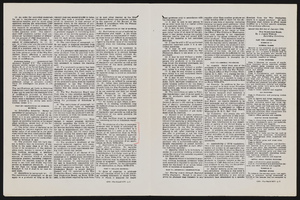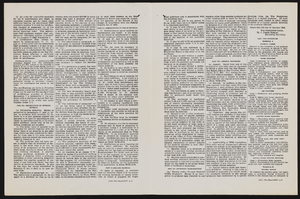Search the Special Collections and Archives Portal
Search Results
Audio clip from interview with Samuel Smith, June 17, 2011
Date
Archival Collection
Description
Part of an interview with Samuel Smith, June 22, 2011. In this clip, Smith speaks about his run-in with Las Vegas police when he moved to the area, and the relationship between police officers and the black community.
Sound
Ralph Roske Papers
Identifier
Abstract
The Ralph Roske Papers (1957-1989) consist of Ralph Roske's book manuscripts, lecture notes, and correspondence. The collection includes extensive lecture notes on the United States Civil War, United States history, and Nevada history. It also includes Roske's research and manuscripts on Nevada, California, and the United States Civil War, as well as student
papers. Ralph Roske was a professor of history at the University of Nevada, Las Vegas (UNLV).
Archival Collection
Charlotte Hill Papers
Identifier
Abstract
The Charlotte Hill Papers (1975-1996) document Charlotte Hill’s commitment to the Las Vegas, Nevada community and especially to the local PBS affiliate, KLVX Channel 10. The majority of the collection relates to KLVX Channel 10 and the work of the Friends of Channel 10 on behalf of the station, in particular information about fundraising events and volunteers. It also contains material related to Hill's membership in national organizations associated with public broadcasting. The collection includes some material about her work with the American Camping Association and the Las Vegas Sun Summer Camp Fund.
Archival Collection
University of Nevada, Las Vegas Creative Services Records (2000s)
Identifier
Abstract
This is part 4 of 6 finding aids for the University of Nevada, Las Vegas Creative Services Records and represents 2000 to 2009. Generally, materials are transferred from UNLV Photo Services to UNLV Special Collections and Archives 5 years after they are created. For materials within the last 5 years, contact photo@unlv.edu or call 702-895-3036. This finding aid contains the contact sheets and digital files produced by the University of Nevada, Las Vegas from 2000 to 2009 as an official record of the institution's development, activities, and community. Clients include UNLV colleges and departments, the University's administration, the UNLV Foundation, athletic departments, and the Nevada System of Higher Education (NSHE). Images include academic activities, athletic events, faculty and administration, student life, campus life, campus development, architecture, and public relations.
Archival Collection
Aplin Family Scrapbooks
Identifier
Abstract
The Aplin Family Scrapbooks (1927-1971) consists of four handmade scrapbooks compiled by Hilda Aplin. The scrapbooks contain photographs, correspondence, newspaper clippings, and handwritten captions. The majority of the collection focuses on Hilda and Charles Aplin’s involvement in the Fraternal Order of Eagles and Las Vegas Eagles Auxiliary #1213. Also included is a photograph album that details the family’s activities from 1927 to 1959, including notable locations around Las Vegas, Nevada such as Lake Mead, Hoover Dam, Mt. Charleston, and annual Helldorado parades.
Archival Collection

James L. Hogan interview, March 11, 1978: transcript
Date
Archival Collection
Description
On March 11, 1978, collector Patty L. Baratti interviewed James Hogan (born April 6th, 1909 in Winton Place, Ohio) at his home in Las Vegas, Nevada. In this interview, Hogan talks about his time working with the telephone company in Arizona and moving to Las Vegas, Nevada. He discusses his time working on grazing rights and cattle ranching in Nevada and how planning went to ensure that farms were able to have land to graze their animals. He speaks about dealing with farmers, corporations, and the government and the frustrations he had to deal with before there were set laws about grazing. He also discusses the change from mainly family farms in Nevada to corporations owning much of the farmland.
Text

Transcript of interview with Stephen Nasser by Barbara Tabach, January 17, 2018
Date
Archival Collection
Description
At the age of thirteen, the incredible life journey of Stephen “Pista” Nasser (b. 1931 - ) is preserved in his heart. His ordeal begins when his family are ripped from their home to be interred in a Nazi concentration camp in 1944. Fifty years later, he sits in his Las Vegas home and reflects on his calling to write and speak about his survival and losses. His ordeal is preserved in his book My Brother’s Voice (2013) and in his follow up stage production Not Now Pista. He is also the author of a companion memoir, Journey to Freedom. Stephen and his wife Francoise are tireless in their travels throughout the United States and the world. At the time of this 2018 oral history interview, Stephen had done over 1092 presentations about his harrowing life story to thousands of people of all ages and denominations. Each presentation fills a spot in his heart as he honors his brother and reminds listeners that such devastating episode in history should not be forgotten, and should never occur again. The timing of this interview also coincided with the premiere of a 20-minute documentary based on his writings and the play production. It was shown at the 2018 Las Vegas Jewish Film Festival. Note: the photo above of Stephen and Francoise Nasser was taken shortly after this interview on their next cruise. (2018)
Text



